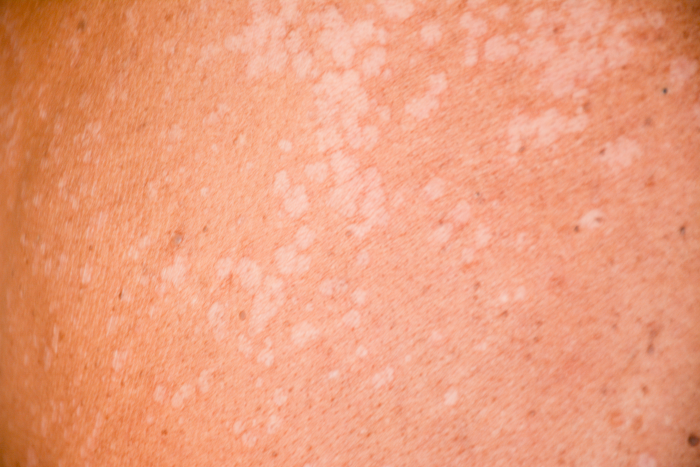Tinea versicolor is a very common skin condition. However, patients struggle to find effective treatments. We understand the frustration of dealing with tinea versicolor. At the Trillium Clinic, our solutions are designed to address tinea versicolor at its cause, helping your skin heal and giving you the clear, healthy skin you desire. Begin your advanced tinea versicolor treatments today, and say goodbye to the persistent rash of tinea versicolor.
What is Tinea Versicolor

The main symptom of tinea versicolor is the development of discolored patches on the skin. These patches may be lighter or darker than the surrounding skin and can vary in color, such as white, pink, tan, or brown. Other symptoms may include:
Scaling or flaking of the skin: The affected areas may have a fine, powdery appearance due to the accumulation of dead skin cells.
Itching: Some individuals may experience mild to moderate itching, although this is not always present.
What Causes Tinea Versicolor
Tinea versicolor is caused by an overgrowth of the yeast Malassezia on the skin. The exact reasons why this overgrowth occurs are not fully understood, but certain factors can contribute to its development, including:
Hot and humid environments: Warm and humid conditions promote the growth of Malassezia, making individuals more susceptible to tinea versicolor.
Oily skin: Excess oil production can provide a favorable environment for the growth of Malassezia.
Hormonal changes: Hormonal fluctuations, such as those occurring during puberty or pregnancy, can increase the risk of developing tinea versicolor.
Weakened immune system: People with weakened immune systems, such as those with HIV/AIDS or certain autoimmune conditions, may be more prone to fungal infections.
How is Tinea Versicolor treated
The treatment of tinea versicolor aims to eliminate the fungal overgrowth and prevent its recurrence. It may involve:
Topical antifungal medications: Antifungal creams, lotions, or shampoos containing active ingredients like ketoconazole, selenium sulfide, or zinc pyrithione can be applied to the affected areas to kill the fungus.
Oral antifungal medications: In severe or widespread cases, oral antifungal medications may be prescribed to treat the infection from within the body.
Maintenance therapy: To prevent recurrence, periodic use of antifungal cleansers or shampoos may be recommended.
To reduce the risk of developing tinea versicolor or prevent its recurrence, you can take the following preventive measures:
Maintain good hygiene: Regularly cleanse and dry the skin, paying attention to areas prone to sweating.
Avoid excessive heat and humidity: When possible, stay in cool and well-ventilated environments.
Wear loose-fitting clothing: Loose-fitting clothing allows air to circulate and reduces moisture buildup on the skin.
Limit oil-based products: Avoid using heavy, oil-based skincare products that can contribute to skin oiliness.
Embark on your journey to radiant skin
It’s important to consult with a dermatologist for an accurate diagnosis and personalized treatment plan for tinea versicolor. Dermatologists can provide guidance on the most appropriate treatment options based on individual symptoms and needs. Although tinea versicolor can be persistent, it does not affect overall health. If you are suffering from tinea versicolor make an appointment here to see one of the dermatology providers at the Trillium Clinic in Chapel Hill. We are currently accepting new patients from Chapel Hill, Carrboro, Hillsborough, Pittsboro, Mebane, Durham, Burlington, Cary, and surrounding cities, who suffer from tinea versicolor. Call us today to discuss the various treatment options.

